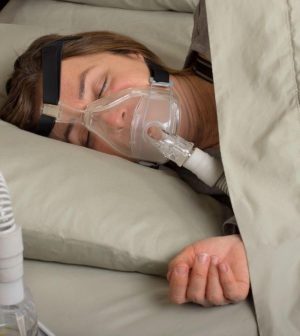- FDA Approves New Antibiotic Against UTIs
- New School Lunch Rules Target Added Sugars, Salt
- Dairy Cows Moved Across State Lines Must Now Be Tested for Bird Flu
- TikTok Riddled With Misleading Info on Health: Study
- Emulsifier Chemicals Are Everywhere in Foods. Could They Raise Diabetes Risk?
- Opioids During Pregnancy May Not Raise Psychiatric Risks for Offspring
- Could Heartburn Meds Raise Your Migraine Risk?
- Drug, Alcohol Abuse Goes Untreated in Many Ex-Prisoners
- Watchdog Group Says U.S. Food Recalls Rose Again Last Year
- Genes Could Mix With Pesticide Exposure to Raise Parkinson’s Risk
Sleep Apnea Doubles Odds for Sudden Death

With apologies to William Shakespeare, this is the stuff bad dreams are made of: Sleep apnea may double your risk for sudden death.
The condition — in which a person’s airway is repeatedly blocked during sleep, causing pauses in breathing — may also increase the risk for high blood pressure, coronary artery disease and congestive heart failure, new research shows.
“This [study] adds to the growing body of evidence that highlights the importance of screening, diagnosis and treatment of sleep apnea,” said Dr. Kannan Ramar, immediate past president of the American Academy of Sleep Medicine (AASM).
Ramar, who reviewed the findings, said they underscore the importance of recognizing a widespread and often underdiagnosed condition that has become a growing public health concern.
For the study, a team at Penn State University reviewed 22 studies that included more than 42,000 patients worldwide. Their review revealed that people with obstructive sleep apnea had a greater risk of dying suddenly and the risk rose as patients aged.
“Our research shows this condition can be life-threatening,” principal investigator Anna Ssentongo said in a university news release. She’s an assistant professor and epidemiologist at Penn State.
The repeated lapses in breathing in sleep apnea cut off oxygen supply to cells, which can result in an imbalance of antioxidants in the body. This imbalance harms cells and may speed up the aging process, leading to many health problems, the researchers said.
The study authors said the findings underscore the urgency of treating sleep apnea.
Continuous positive airway pressure (CPAP) is the standard treatment for moderate to severe apnea, according to the AASM. CPAP provides a steady stream of pressurized air through a mask worn during sleep. The airflow keeps the airway open, preventing pauses in breathing while restoring normal oxygen levels.
Other options include oral appliances designed to keep the airway open and, in some cases, surgery to remove tissue from the soft palate, uvula, tonsils, adenoids or tongue.
Losing weight also benefits many people with sleep apnea, as does sleeping on one’s side. Generally, over-the-counter nasal strips, internal nasal dilators, and lubricant sprays reduce snoring, but AASM says there is no evidence that they help treat sleep apnea.
Dr. Tetyana Kendzerska, an assistant professor of medicine in the division of respirology at the University of Ottawa in Canada, noted that this is not the first study to find a link between sleep apnea and early death.
She noted that apnea can increase the risk of sudden death in several ways, including off-and-on deficiency in supply of oxygen to tissues; sleep fragmentation; inflammation; and chronic activation of the nervous system.
Kendzerska, who was not involved in the study, said it might be assumed that treating apnea would reduce the risk of sudden death, but that may not be the case.
She noted that a preliminary report from the U.S. Agency for Healthcare Research and Quality suggested there is scant evidence that CPAP lowers the risk of all-cause death, stroke, heart attack or other heart problems.
“It means that we need more and better quality studies to show the effect of CPAP on all-cause mortality and cardiovascular outcomes,” she said.
The findings were recently published online in the journal BMJ Open Respiratory Research.
More information
To learn more about sleep apnea, visit the American Academy of Sleep Medicine.
SOURCES: Kannan Ramar, MD, immediate past president, American Academy of Sleep Medicine, Darien, Ill.; Tetyana Kendzerska, MD, PhD, assistant professor, medicine, University of Ottawa, Ontario, Canada; BMJ Open Respiratory Research, June 9, 2021, online
Source: HealthDay
Copyright © 2024 HealthDay. All rights reserved.










